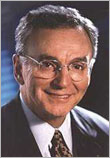|

Remarks

 |
Dr. Joseph Bordogna
Deputy Director and Chief Operating Officer
National Science Foundation
Biography
Remarks
2005 IGERT Project Meeting
May 19, 2005
|
Good morning, and welcome to Arlington. I want to add a special greeting to the graduate students attending today. This meeting is focusing on "the future," and you are the future. You will carry science and engineering research and education into succeeding generations. In a real sense, you are becoming the progenitors of integrative research and education John Dewey, an American philosopher and educator in the last century, believed that the scientific method could be applied to educational theory.
He said, "the future of our civilization depends upon the widening spread, and deepening hold, of the scientific habit of mind," and that the role of our education system was to "discover how to mature and make effective this scientific habit."1
Indeed, the scientific approach to discovery at the frontier of knowledge has continually matured over the years, growing from narrow thrusts at the frontier, mostly limited by rudimentary tools, to today’s assault on large spans across the frontier enabled by integrative teams and powerful enabling tools.
We have been moving from a singular reverence for reductionist investigation only, to a maturing consideration of the holistic nature of nature and humankind’s proclivity to getting things done through integrative processes. In street language, we now focus on disciplinary strength, not only in and of itself but more so as an enabler of boundary crossing assaults on the frontier. Rhetoric is changing from discovery at the frontier to discovery along the frontier. The need for educational institutions to continually adapt to this phenomenon is supported by IGERT funds and is its purpose.
IGERT expands the concept of a doctoral education beyond depth in a discipline to include functional literacy in boundary-crossing research, often in emerging fields, which has a characteristic of generating the most exciting new knowledge at disciplinary interfaces.
More than 120 IGERT awards over seven years have encouraged doctoral students to participate in boundary-crossing investigations in areas such as cellular engineering, computational biology, and geographic information science, as only 3 examples of many. The result is so robust that it is difficult to express the totality of boundaries, both disciplinary and organizational, that have been crossed, linked, integrated.
Investments in IGERT projects come from many of the disciplinary structures in NSF's portfolio. That's because every NSF directorate is committed to integrating research and education to produce graduates who will meet the science and engineering challenges of the future.
Every one of you here today is playing a part in this ever more visible evolution.
Those of you who are IGERT faculty sponsors and researchers -- there are 2,000 of you altogether -- are supporting an important national goal of a holistic approach to education and research. You are pioneers in what we might label the generic specialty of “construction of the whole.”
You have committed to effectively leading your students toward their own futures, shaping a generation of integrative pioneers.
Those of you who are graduate students participating in IGERT deserve congratulations on your foresight. You have recognized that what you are learning and experiencing enables a career that can be sustained over a lifetime. The demand for integrative scientists and engineers is far more robust than it is for analysts only. More than 2,000 graduate students have been funded through IGERT, in addition to many others associated with IGERT projects in other ways.
Another one of America’s philosophers, Eric Hoffer, reminded us: "In times of change, learners inherit the earth; while the learned find themselves beautifully equipped to deal with a world that no longer exists."2
Eric Hoffer never attended a formal school. He was self-taught. Yet he, like you, recognized the value of current learning as the key to keeping up with changing times.
You are here today at this specific meeting to do one of the things you already do well: work together across boundaries to learn from each other, evaluate your collective achievements, and contribute to the evolution of integrative investigation.
This is just the beginning of the opportunity open to us by IGERT: broadening participation in the IGERT program as a core strategy as well as
finding ways to make IGERT the vanguard of a more rapidly-paced evolution that will rally still more educators, researchers, and students to the cause.
We want to better understand the mechanisms for change and develop models for graduate education attractive to all across the land.
This is a grand opportunity for the future in which you have all chosen to participate. Congratulations on your decision, and your accomplishments so far. We at NSF are grateful for your participation, and we look forward to serving as your partner in moving forward.

1 Speech in Boston, 1909, published in Science, 1910, v.31, no. 787.
Return to speech.
2 Paraphrased from Reflections on the Human Condition, 1932.
Return to speech.

Return to a list of Dr. Bordogna's speeches.
|











